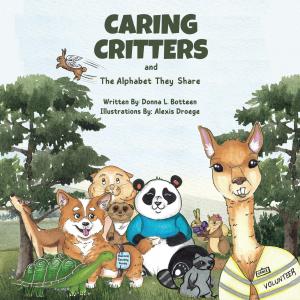Caring Critters and The Alphabet They Share: A Book About Love, Kindness, and Empathy
Caring Critters and the Alphabet They Share by Donna L. Botteen offers young readers a joyful, values-driven journey through the ABCs with heartwarming animal illustrations to engage readers aged 2 to 6.
This charming picture book introduces 26 delightful critters, each embodying a core value that uplifts, inspires, and guides children in how to treat others and themselves with compassion and confidence.
From Ava Antelope's sincere Apology to Zelda Zebra's energetic Zest, every page brings a new character and a powerful life lesson, all wrapped in rhythmic, accessible language that children will love.
The book is designed to nurture young children's social-emotional learning and character development, celebrate diversity, encourage leadership, and build self-esteem. Beautifully illustrated by Alexis Droege, Caring Critters invites families, educators, and caregivers to slow down and engage with children in meaningful conversations about values that matter.
Caring Critters is a loving and impactful resource for helping children grow into thoughtful, confident, and compassionate individuals, and it is perfect for reading aloud at home, in the classroom, or during storytime.
To learn more or get your copy of Caring Critters and the Alphabet They Share, visit https://a.co/d/2BJFab9
About the Author
Donna L. Botteen lives in Portland, Oregon, with her husband Ray, her mother, and their two cats, Henny and Tucker. Married for over 40 years, Donna and Ray have built a beautiful family together, including four children and seven grandchildren who continue to inspire and enrich their lives.
Moved by the tragic Columbine High School shooting in 1999, Donna felt compelled to write something that could promote kindness, empathy, compassion, and equality. Caring Critters and the Alphabet They Share is Donna's debut children's book, born out of a deep desire to make a difference in the hearts and minds of young readers.
Donna L. Botteen
Caring Critters and the Alphabet They Share
email us here
Visit us on social media:
Facebook
X
Instagram
Other
Legal Disclaimer:
EIN Presswire provides this news content "as is" without warranty of any kind. We do not accept any responsibility or liability for the accuracy, content, images, videos, licenses, completeness, legality, or reliability of the information contained in this article. If you have any complaints or copyright issues related to this article, kindly contact the author above.
ACP Painting, LLC Featured on Rosie On The House Podcast: A Deep Dive Into Arizona House Painting
Premium 73‑Acre Off‑Grid Luxury Barndominium Estate Listed Near Richards, Texas
Insurance School of TampaBay (ISOTB) now offers tutoring to non-ISOTB students
Kalendarium
Więcej ważnych informacji
 Jedynka Newserii
Jedynka Newserii

 Jedynka Newserii
Jedynka Newserii

Prawo

Trwają dyskusje nad kształtem unijnego budżetu na lata 2028–2034. Mogą być rozbieżności w kwestii Funduszu Spójności czy dopłat dla rolników
Trwają prace nad wieloletnimi unijnymi ramami finansowymi (WRF), które określą priorytety wydatków UE na lata 2028–2034. W maju Parlament Europejski przegłosował rezolucję w sprawie swojego stanowiska w tej sprawie. Postulaty europarlamentarzystów mają zostać uwzględnione we wniosku Komisji Europejskiej w sprawie WRF, który zostanie opublikowany w lipcu 2025 roku. Wciąż jednak nie ma zgody miedzy państwami członkowskimi, m.in. w zakresie Funduszu Spójności czy budżetu na rolnictwo.
Konsument
35 proc. gospodarstw domowych nie stać na zakup mieszkania nawet na kredyt. Pomóc może wsparcie budownictwa społecznego i uwolnienie gruntów pod zabudowę

W Polsce co roku oddaje się do użytku ok. 200 tys. mieszkań, co oznacza, że w ciągu dekady teoretycznie potrzeby mieszkaniowe społeczeństwa mogłyby zostać zaspokojone. Jednak większość lokali budują deweloperzy na sprzedaż, a 35 proc. gospodarstw domowych nie stać na zakup nawet za pomocą kredytu. Jednocześnie ta grupa zarabia za dużo, by korzystać z mieszkania socjalnego i komunalnego. Zdaniem prof. Bartłomieja Marony z UEK zmniejszeniu skali problemu zaradzić może wyłącznie większa skala budownictwa społecznego zamiast wspierania kolejnymi programami zaciągania kredytów.
Problemy społeczne
Hejt w sieci dotyka coraz więcej dzieci w wieku szkolnym. Rzadko mówią o tym dorosłym

Coraz większa grupa dzieci zaczyna korzystać z internetu już w wieku siedmiu–ośmiu lat – wynika z raportu NASK „Nastolatki 3.0”. Wtedy też stykają się po raz pierwszy z hejtem, którego jest coraz więcej w mediach społecznościowych. Według raportu NASK ponad 2/3 młodych internautów uważa, że mowa nienawiści jest największym problemem w sieci. Co więcej, dzieci rzadko mówią o takich incydentach dorosłym, dlatego tym istotniejsze są narzędzia technologiczne służące ochronie najmłodszych.
Partner serwisu
Szkolenia

Akademia Newserii
Akademia Newserii to projekt, w ramach którego najlepsi polscy dziennikarze biznesowi, giełdowi oraz lifestylowi, a także szkoleniowcy z wieloletnim doświadczeniem dzielą się swoją wiedzą nt. pracy z mediami.









.gif)

 |
| |
| |
|